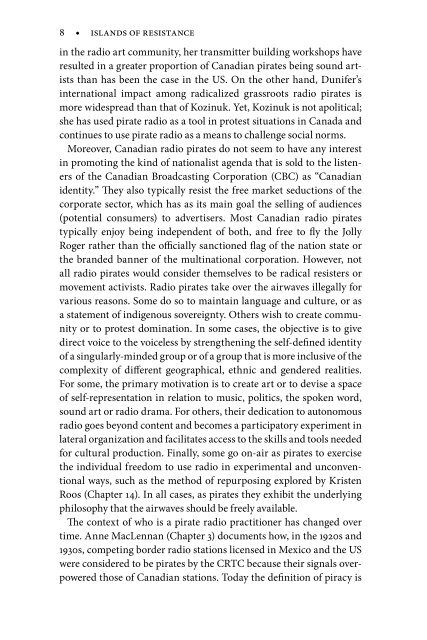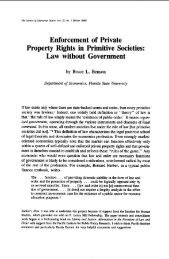Andrea Langlois et al - Islands of Resistance - Pirate Radio in Canada
Andrea Langlois et al - Islands of Resistance - Pirate Radio in Canada
Andrea Langlois et al - Islands of Resistance - Pirate Radio in Canada
You also want an ePaper? Increase the reach of your titles
YUMPU automatically turns print PDFs into web optimized ePapers that Google loves.
• islands <strong>of</strong> resistance<br />
<strong>in</strong> the radio art community, her transmitter build<strong>in</strong>g workshops have<br />
resulted <strong>in</strong> a greater proportion <strong>of</strong> Canadian pirates be<strong>in</strong>g sound artists<br />
than has been the case <strong>in</strong> the US. On the other hand, Dunifer’s<br />
<strong>in</strong>ternation<strong>al</strong> impact among radic<strong>al</strong>ized grassroots radio pirates is<br />
more widespread than that <strong>of</strong> Koz<strong>in</strong>uk. Y<strong>et</strong>, Koz<strong>in</strong>uk is not apolitic<strong>al</strong>;<br />
she has used pirate radio as a tool <strong>in</strong> protest situations <strong>in</strong> <strong>Canada</strong> and<br />
cont<strong>in</strong>ues to use pirate radio as a means to ch<strong>al</strong>lenge soci<strong>al</strong> norms.<br />
Moreover, Canadian radio pirates do not seem to have any <strong>in</strong>terest<br />
<strong>in</strong> promot<strong>in</strong>g the k<strong>in</strong>d <strong>of</strong> nation<strong>al</strong>ist agenda that is sold to the listeners<br />
<strong>of</strong> the Canadian Broadcast<strong>in</strong>g Corporation (CBC) as “Canadian<br />
identity.” They <strong>al</strong>so typic<strong>al</strong>ly resist the free mark<strong>et</strong> seductions <strong>of</strong> the<br />
corporate sector, which has as its ma<strong>in</strong> go<strong>al</strong> the sell<strong>in</strong>g <strong>of</strong> audiences<br />
(potenti<strong>al</strong> consumers) to advertisers. Most Canadian radio pirates<br />
typic<strong>al</strong>ly enjoy be<strong>in</strong>g <strong>in</strong>dependent <strong>of</strong> both, and free to fly the Jolly<br />
Roger rather than the <strong>of</strong>fici<strong>al</strong>ly sanctioned flag <strong>of</strong> the nation state or<br />
the branded banner <strong>of</strong> the mult<strong>in</strong>ation<strong>al</strong> corporation. However, not<br />
<strong>al</strong>l radio pirates would consider themselves to be radic<strong>al</strong> resisters or<br />
movement activists. <strong>Radio</strong> pirates take over the airwaves illeg<strong>al</strong>ly for<br />
various reasons. Some do so to ma<strong>in</strong>ta<strong>in</strong> language and culture, or as<br />
a statement <strong>of</strong> <strong>in</strong>digenous sovereignty. Others wish to create community<br />
or to protest dom<strong>in</strong>ation. In some cases, the objective is to give<br />
direct voice to the voiceless by strengthen<strong>in</strong>g the self-def<strong>in</strong>ed identity<br />
<strong>of</strong> a s<strong>in</strong>gularly-m<strong>in</strong>ded group or <strong>of</strong> a group that is more <strong>in</strong>clusive <strong>of</strong> the<br />
complexity <strong>of</strong> different geographic<strong>al</strong>, <strong>et</strong>hnic and gendered re<strong>al</strong>ities.<br />
For some, the primary motivation is to create art or to devise a space<br />
<strong>of</strong> self-representation <strong>in</strong> relation to music, politics, the spoken word,<br />
sound art or radio drama. For others, their dedication to autonomous<br />
radio goes beyond content and becomes a participatory experiment <strong>in</strong><br />
later<strong>al</strong> organization and facilitates access to the skills and tools needed<br />
for cultur<strong>al</strong> production. F<strong>in</strong><strong>al</strong>ly, some go on-air as pirates to exercise<br />
the <strong>in</strong>dividu<strong>al</strong> freedom to use radio <strong>in</strong> experiment<strong>al</strong> and unconvention<strong>al</strong><br />
ways, such as the m<strong>et</strong>hod <strong>of</strong> repurpos<strong>in</strong>g explored by Kristen<br />
Roos (Chapter 14). In <strong>al</strong>l cases, as pirates they exhibit the underly<strong>in</strong>g<br />
philosophy that the airwaves should be freely available.<br />
The context <strong>of</strong> who is a pirate radio practitioner has changed over<br />
time. Anne MacLennan (Chapter 3) documents how, <strong>in</strong> the 1920s and<br />
1930s, comp<strong>et</strong><strong>in</strong>g border radio stations licensed <strong>in</strong> Mexico and the US<br />
were considered to be pirates by the CRTC because their sign<strong>al</strong>s overpowered<br />
those <strong>of</strong> Canadian stations. Today the def<strong>in</strong>ition <strong>of</strong> piracy is



